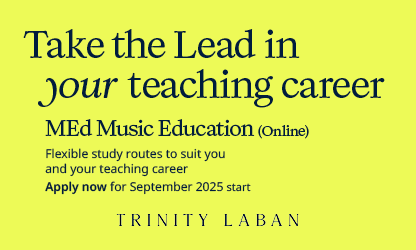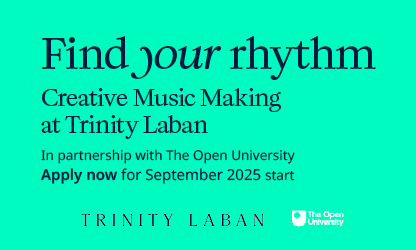Youth engagement resource: Overview
Many music groups tell us they find it challenging to attract younger members. With the help of a generous legacy from lifelong choral singer Pauline Thompson, we have been able to compile a bank of resources aimed at helping you to reach out to under-35 year olds.
We'll continue to add to these resources, but in the meantime if you think we're missing something that would be helpful for groups like yours, or if you have any questions, just get in touch.
Young People and Participation in Amateur Music Groups – Research Results: Our research found that the most common reason for young people’s music making falling by the wayside was transition – either leaving school or university, or changing jobs (48%). Read more about this and other findings in the full report of our research into under- 35 year olds and music.
What can you do?
How to engage under 35s – retention: Top tips for keeping younger members coming back to your group once you’ve got them to come along. We’d suggest starting here, and then moving on to recruitment once you’ve got some good retention strategies in place.
How to engage under 35s – recruitment: Top tips on how to recruit younger members, based on our research into under- 35s and music making.
Recruiting younger members – where to find them: Young people might not be specifically looking for a group to join, or might not be aware of groups in their area. So instead of waiting for them to find you, go to where they are! But where might they be? Here are a few ideas to get you started.
Working with music education hubs: It’s well -documented that young people stop being involved in music making from the age of 18 when they leave the formal education system. Collaborations with Music Education Hubs could be one way to prevent some of this from happening.
How to find new young audiences and members as an Arts Award supporter: Arts Award is a range of qualifications provided by Trinity College for anyone aged up to 25. This resource looks at why this could be a useful scheme for Making Music members to know about, and how to best interact with it as an Arts Award Supporter.
Connecting with young people
Once you’ve identified where to find your potential members, here are some practical tools to help you connect with them more effectively.
Top 5 tips for designing posters: Whether you're designing your own posters or paying a professional to do them for you, here are our top five tips for making sure they grab your audience's attention.
How to get started with social media: This resource is a beginners' guide with basic steps for you to set up and start to use accounts on Twitter, Facebook, Instagram and LinkedIn.
Top tips for social media: Being active on social media can be a great way for your group to grow your audiences, build relationships, recruit new members and learn from other groups, but it takes effort to make the most of it.
Top tips for managing an engaging facebook page: At the time of writing, there are about 702,000 people on Facebook in the UK that expressed an interest in choirs; 506,000 that like orchestras and a staggering 27,818,000 that like music. These are all potential audiences that you can reach if you know how to target them.
Top photography tips: Eye-catching and powerful images on your website and social media could help you attract audiences, new members and maybe even hirings and other engagements. So let’s look at some tips to help you produce and share those great photos.
Top video tips: Your group may not have the budget to hire a professional crew to film your next performance, but that doesn't mean that you can't produce attractive and engaging video with the most basic tools.
Safeguarding coversheet: If you’ve got under 18 year olds or adults at risk in your group, you should definitely make sure your safeguarding practices are up to date. Here are a range of resources we have created to help you with this (including a template policy).
We hope you find this Making Music resource useful. If you have any comments or suggestions about the guidance please contact us. Whilst every effort is made to ensure that the content of this guidance is accurate and up to date, Making Music do not warrant, nor accept any liability or responsibility for the completeness or accuracy of the content, or for any loss which may arise from reliance on the information contained in it.



